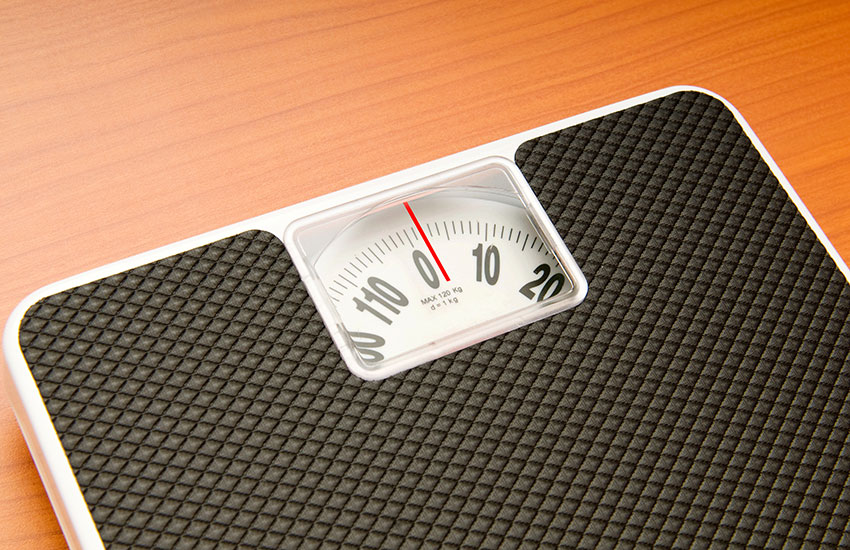
Many psychologists and health professionals believe that scales are evil and should be thrown out the window. They argue that scales are unreliable at measuring fat and they can throw your day into disarray all on the basis of an arbitrary number. They argue that scales perpetuate the cycle of poor body image and get in the way of you having a healthy relationship with food. To weigh or not to weight... that is the question.
It is true, that your weight will fluctuate on your weight loss journey; it most likely won’t follow that simple trajectory of constant decline. The number on that scale will depend on various factors not just fat including: hormones, water retention, your muscle mass, the clothes you are wearing, what you ate yesterday, how much salt you consumed yesterday, what time of the day you weighed yourself etc.
I however, have a different opinion to the health professionals that argue scales are evil and destructive. I don’t believe that technology itself directly causes people to have a bad day or poor body image. As a cognitive therapist, I believe that it is our thoughts that cause us to have a bad day or poor body image. I also believe that measurement is crucial for weight loss and weight maintenance. I believe that fear of the scales is destructive in both weight loss and eating disorders like Anorexia Nervosa.
Now, don’t get me wrong, I think that there can be unhealthy use of the scales. If you find yourself getting on them multiple times a day and this is causing your mood to fluctuate then you have a problem that needs to be addressed. However, the answer is not to throw the scales out the window but rather to look at your sabotaging thinking that leads you to feel defeated, depressed and anxious.
If you only hop on the scales when you have been ‘good’ with your diet this is also a problem you need to deal with. This reinforces a black and white thinking pattern that you are either ‘good’ or ‘bad’ which will damage your weight loss and weight maintenance down the track.
Measurement of weight with the scales in a long term context (i.e., over months and years not just days and weeks) can be a very effective, cheap and super simple way of measuring progress and having accountability.
It is absolutely crucial you see the scales as a long term tool. I encourage my clients to use their scales either daily or weekly. You must expect and anticipate fluctuations and remember that this is normal. If you find you freak out when you look at the scales then I would recommend you need to do some cognitive therapy to learn tools to think about the scales as a long term strategy.
If you are creative with excel you can graph your daily or weekly measurements. This will help you to keep that long term perspective and not freak out when you see short term fluctuations. You might even notice trends in terms of times that you fluctuate (e.g., with monthly hormonal changes) which can help you to manage your expectations.
It is important to expect that there will be fluctuations. If you are the kind of person who freaks out if you see an increase in that number, you need to deal with it! One technique is to weigh yourself before and after eating dinner, or at the beginning and end of the day. Chances are the number on the scales will have increased. Notice your thoughts and challenge them if they are sabotaging. Notice your feelings and if they are really unpleasant – practice some mindfulness.
Many people beat themselves up when they eat ‘bad’ food. They might have a piece of chocolate cake and a glass of champagne and assume that they have blown their diet; they think “there is no way I will get on the scales today’. When you buy into this belief it can easily lead to a binge and giving up the weight loss efforts for a period of time. Chances are the weight you have lost will creep back at this point.
Instead, use the scales to challenge your thinking about ‘bad’ food and having occasional treats. The scales allow you to collect real long term evidence about whether that treat you had was really a catastrophe. Often it is not. This helps you collect evidence that it is okay to have treats occasionally and you can relax and enjoy it. You haven’t blown your hard work. See my article “Is thinking making you fat?”.
Dr Louisa Hoey is a health psychologist. She is the Director of the Health Psychology Centre. Louisa specialises in the psychological aspects of food, the emotional relationships around food and the development of strategies to a happier more fuller life.
Louisa is available for consultation. Make a booking now either by telephone on (03)9852-8497 or via the booking enquiry form.
